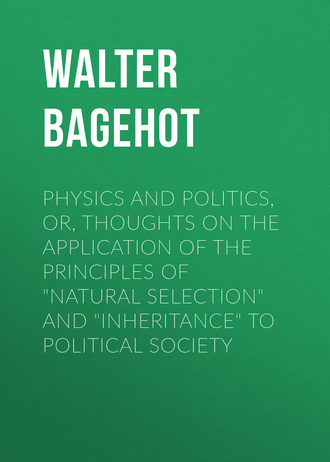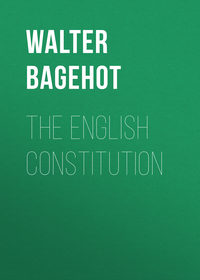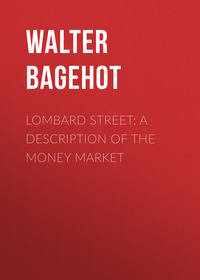 полная версия
полная версияPhysics and Politics, or, Thoughts on the application of the principles of "natural selection" and "inheritance" to political society
The necessity of thus forming co-operative groups by fixed customs explains the necessity of isolation in early society. As a matter of fact all great nations have been prepared in privacy and in secret. They have been composed far away from all distraction. Greece, Borne, Judaea, were framed each by itself, and the antipathy of each to men of different race and different speech is one of their most marked peculiarities, and quite their strongest common property. And the instinct of early ages is a right guide for the needs of early ages. Intercourse with foreigners then broke down in states the fixed rules which were forming their characters, so as to be a cause of weak fibre of mind, of desultory and unsettled action; the living spectacle of an admitted unbelief destroys the binding authority of religious custom and snaps the social cord.
Thus we see the use of a sort of 'preliminary' age in societies, when trade is bad because it prevents the separation of nations, because it infuses distracting ideas among occupied communities, because it 'brings alien minds to alien shores. And as the trade which we now think of as an incalculable good, is in that age a formidable evil and destructive calamity; so war and conquest, which we commonly and justly see to be now evils, are in that age often singular benefits and great advantages. It is only by the competition of customs that bad customs can be eliminated and good customs multiplied. Conquest is the premium given by nature to those national characters which their national customs have made most fit to win in war, and in many most material respects those winning characters are really the best characters. The characters which do win in war are the characters which we should wish to win in war.
Similarly, the best institutions have a natural military advantage over bad institutions. The first great victory of civilisation was the conquest of nations with ill-defined families having legal descent through the mother only, by nations of definite families tracing descent through the father as well as the mother, or through the father only. Such compact families are a much better basis for military discipline than the ill-bound families which indeed seem hardly to be families at all, where 'paternity' is, for tribal purposes, an unrecognised idea, and where only the physical fact of 'maternity' is thought to be certain enough to be the foundation of law or custom. The nations with a thoroughly compacted family system have 'possessed the earth,' that is, they have taken all the finest districts in the most competed-for parts; and the nations with loose systems have been merely left to mountain ranges and lonely islands. The family system and that in its highest form has been so exclusively the system of civilisation, that literature hardly recognises any other, and that, if it were not for the living testimony of a great multitude of scattered communities which are 'fashioned after the structure of the elder world,' we should hardly admit the possibility of something so contrary to all which we have lived amongst, and which we have been used to think of. After such an example of the fragmentary nature of the evidence it is in comparison easy to believe that hundreds of strange institutions may have passed away and have left behind them not only no memorial, but not even a trace or a vestige to help the imagination to figure what they were.
I cannot expand the subject, but in the same way the better religions have had a great physical advantage, if I may say so, over the worse. They have given what I may call a CONFIDENCE IN THE UNIVERSE. The savage subjected to a mean superstition, is afraid to walk simply about the world—he cannot do THIS because it is ominous, or he must do THAT because it is lucky, or he cannot do anything at all till the gods have spoken and given him leave to begin. But under the higher religions there is no similar slavery and no similar terror.
The belief of the Greek
eis oianos aristos amúnesthai perì pátrês;the belief of the Roman that he was to trust in the gods of Borne, for those gods are stronger than all others; the belief of Cromwell's soldiery that they were 'to trust in God and keep their powder dry,' are great steps in upward progress, using progress in its narrowest sense. They all enabled those who believed them 'to take the world as it comes,' to be guided by no unreal reason, and to be limited by no mystic scruple; whenever they found anything to do, to do it with their might. And more directly what I may call the fortifying religions, that is to say, those which lay the plainest stress on the manly parts of morality—upon valour, on truth and industry—have had plainly the most obvious effect in strengthening the races which believed them, and in making those races the winning races.
No doubt many sorts of primitive improvement are pernicious to war; an exquisite sense of beauty, a love of meditation, a tendency to cultivate the force of the mind at the expense of the force of the body, for example, help in their respective degrees to make men less warlike than they would otherwise be. But these are the virtues of other ages. The first work of the first ages is to bind men together in the strong bond of a rough, coarse, harsh custom; and the incessant conflict of nations effects this in the best way. Every nation, is an 'hereditary co-operative group,' bound by a fixed custom; and out of those groups those conquer which have the most binding and most invigorating customs, and these are, as a rough rule, the best customs. The majority of the 'groups' which win and conquer are better than the majority of those which fail and perish, and thus the first world grow better and was improved.
This early customary world no doubt continued for ages. The first history delineates great monarchies, each composed of a hundred customary groups, all of which believed themselves to be of enormous antiquity, and all of which must have existed for very many generations. The first historical world is not a new-looking thing but a very ancient, and according to principle it is necessary that it should exist for ages. If human nature was to be gradually improved, each generation must be born better tamed, more calm, more capable of civilisation—in a word, more LEGAL than the one before it, and such inherited improvements are always slow and dubious. Though a few gifted people may advance much, the mass of each generation can improve but very little on the generation which preceded it; and even the slight improvement so gained is liable to be destroyed by some mysterious atavism—some strange recurrence to a primitive past. Long ages of dreary monotony are the first facts in the history of human communities, but those ages were not lost to mankind, for it was then that was formed the comparatively gentle and guidable thing which we now call human nature.
And indeed the greatest difficulty is not in preserving such a world but in ending it. We have brought in the yoke of custom to improve the world, and in the world the custom sticks. In a thousand cases—in the great majority of cases—the progress of mankind has been arrested in this its earliest shape; it has been closely embalmed in a mummy-like imitation of its primitive existence. I have endeavoured to show in what manner, and how slowly, and in how few cases this yoke of custom was removed. It was 'government by discussion ', which broke the bond of ages and set free the originality of mankind. Then, and then only, the motives which Lord Macaulay counted on to secure the progress of mankind, in fact, begin to work; THEN 'the tendency in every man to ameliorate his condition' begins to be important, because then man can alter his condition while before he is pegged down by ancient usage; THEN the tendency in each mechanical art towards perfection begins to have force, because the artist is at last allowed to seek perfection, after having been forced for ages to move in the straight furrow of the old fixed way.
As soon as this great step upwards is once made, all or almost all, the higher gifts and graces of humanity have a rapid and a definite effect on 'verifiable progress'—on progress in the narrowest, because in the most universally admitted sense of the term. Success in life, then, depends, as we have seen, more than anything else on 'animated moderation,' on a certain combination of energy of mind and balance of mind, hard to attain and harder to keep. And this subtle excellence is aided by all the finer graces of humanity. It is a matter of common observation that, though often separated, fine taste and fine judgment go very much together, and especially that a man with gross want of taste, though he may act sensibly and correctly for a while, is yet apt to break out, sooner or later, into gross practical error. In metaphysics, probably both taste and judgment involve what is termed 'poise of mind,' that is the power of true passiveness—the faculty of 'waiting' till the stream of impressions, whether those of life or those of art have done all that they have to do, and cut their full type plainly upon the mind. The ill-judging and the untasteful are both over-eager; both move too quick and blur the image. In this way the union between a subtle sense of beauty and a subtle discretion in conduct is a natural one, because it rests on the common possession of a fine power, though, in matter of fact, that union may be often disturbed. A complex sea of forces and passions troubles men in life and action, which in the calmer region of art are hardly to be felt at all. And, therefore, the cultivation of a fine taste tends to promote the function of a fine judgment, which is a main help in the complex world of civilised existence. Just so too the manner in which the more delicate parts of religion daily work in producing that 'moderation' which, upon the whole, and as a rule, is essential to long success, defining success even in its most narrow and mundane way, might be worked out in a hundred cases, though it would not suit these pages. Many of the finer intellectual tastes have a similar restraining effect they prevent, or tend to prevent, a greedy voracity after the good things of life, which makes both men and nations in excessive haste to be rich and famous, often makes them do too much and do it ill, and so often leaves them at last without money and without respect.
But there is no need to expand this further. The principle is plain that, though these better and higher graces of humanity are impediments and encumbrances in the early fighting period, yet that in the later era they are among the greatest helps and benefits, and that as soon as governments by discussion have become strong enough to secure a stable existence, and as soon as they have broken the fixed rule of old custom, and have awakened the dormant inventiveness of men, then, for the first time, almost every part of human nature begins to spring forward, and begins to contribute its quota even to the narrowest, even to 'verifiable' progress. And this is the true reason of all those panegyrics on liberty which are often so measured in expression but are in essence so true to life and nature. Liberty is the strengthening and developing power—the light and heat of political nature; and when some 'Caesarism' exhibits as it sometimes will an originality of mind, it is only because it has managed to make its own the products of past free times or neighbouring free countries; and even that originality is only brief and frail, and after a little while, when tested by a generation or two, in time of need it falls away.
In a complete investigation of all the conditions of 'verifiable progress,' much else would have to be set out; for example, science has secrets of her own. Nature does not wear her most useful lessons on her sleeve; she only yields her most productive secrets, those which yield the most wealth and the most 'fruit,' to those who have gone through a long process of preliminary abstraction. To make a person really understand the 'laws of motion' is not easy, and to solve even simple problems in abstract dynamics is to most people exceedingly hard. And yet it is on these out-of-the-way investigations, so to speak, that the art of navigation, all physical astronomy, and all the theory of physical movements at least depend. But no nation would beforehand have thought that in so curious a manner such great secrets were to be discovered. And many nations, therefore, which get on the wrong track, may be distanced—supposing there to be no communication by some nation not better than any of them which happens to stumble on the right track. If there were no 'Bradshaw' and no one knew the time at which trains started, a man who caught the express would not be a wiser or a more business-like man than he who missed it, and yet he would arrive whole hours sooner at the capital both are going to. And unless I misread the matter, such was often the case with early knowledge. At any rate before a complete theory of 'verifiable progress' could be made, it would have to be settled whether this is so or not, and the conditions of the development of physical science would have to be fully stated; obviously you cannot explain the development of human comfort unless you know the way in which men learn and discover comfortable things. Then again, for a complete discussion, whether of progress or degradation, a whole course of analysis is necessary as to the effect of natural agencies on man, and of change in those agencies. But upon these I cannot touch; the only way to solve these great problems is to take them separately. I only profess to explain what seem to me the political prerequisites of progress, and especially of early progress, I do this the rather because the subject is insufficiently examined, so that even if my views are found to be faulty, the discussion upon them may bring out others which are truer and better.
[THE END]1
Huxley's Elementary Physiology, pp. 284-286.
2
Maudsley on the Physiology and Pathology of the Mind, p. 73.
3
See the very careful table and admirable discussion in Sir John Lubbock's Pre-Historic Times.
4
Mr. Bryce
5
Ethnological Society's Transactions, vol. iii. p. 137.
6
Desaugiers.
7
Readers of Scott's life will remember that an admirer of his in humble life proposed to cure him of inflammation of the bowels by making him sleep a whole night on twelve smooth stones, painfully collected by the admirer from twelve brooks, which was, it appeared, a recipe of sovereign traditional power. Scott gravely told the proposer that he had mistaken the charm, and that the stones were of no virtue unless wrapped up in the petticoat of a widow who never wished to marry again, and as no such widow seems to have been forthcoming, he escaped the remedy.




